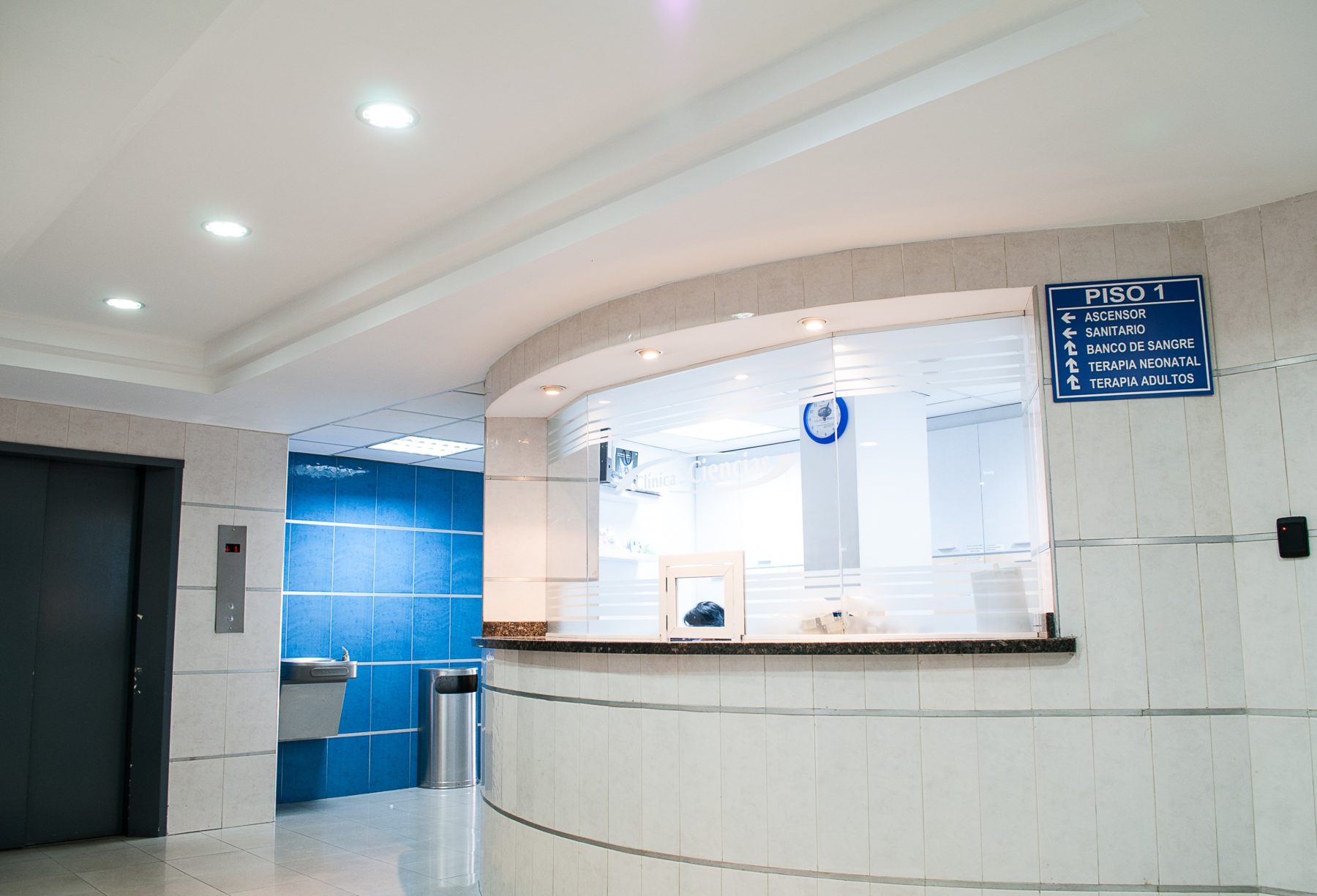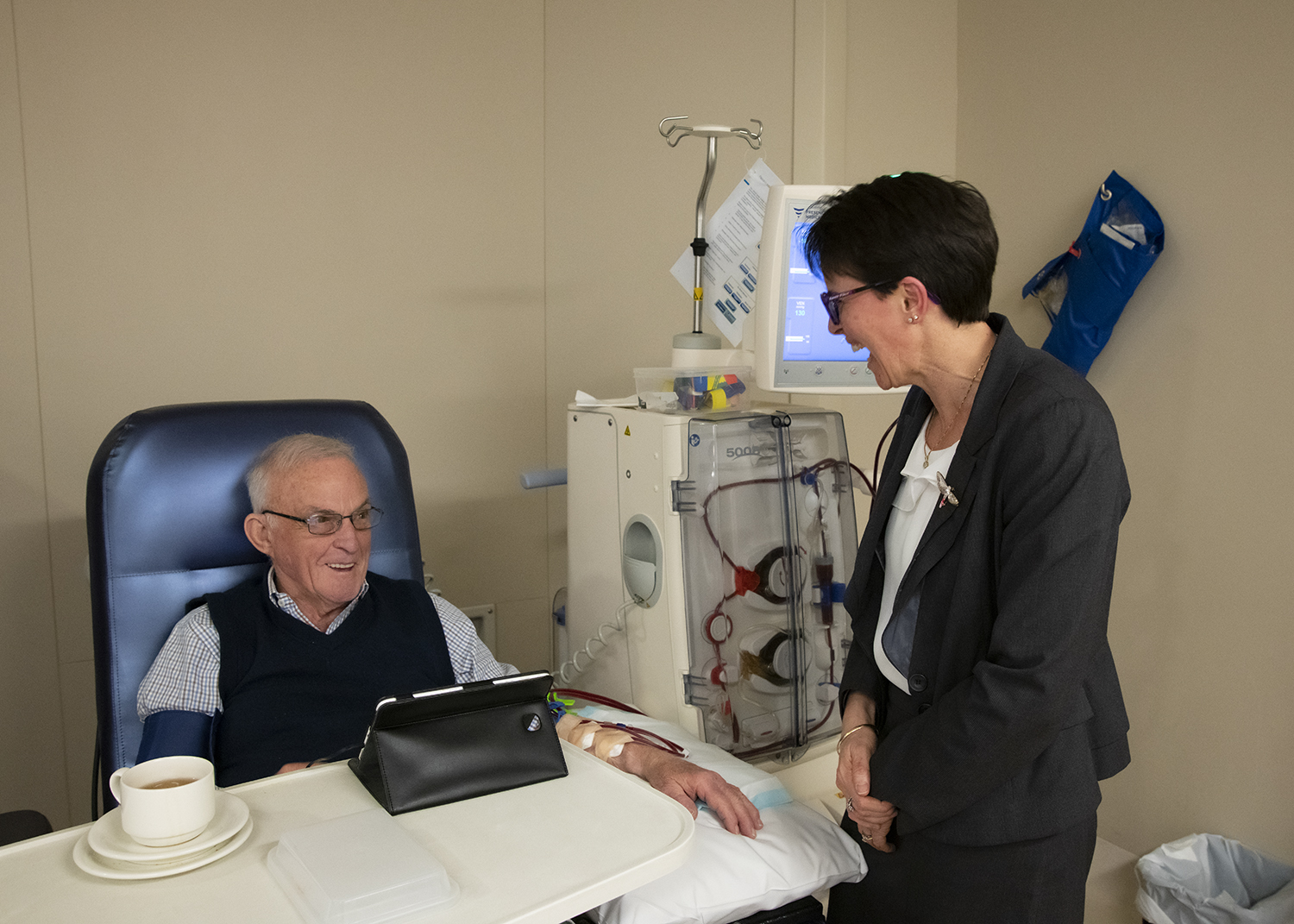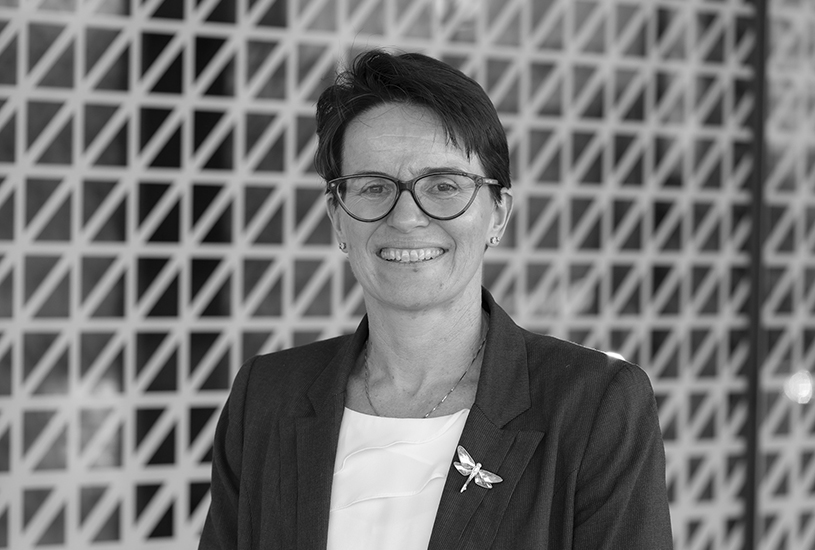Karen Dwyer, in no particular order, is a nephrologist, former marathon runner, transplant physician, patient advocate, medical and epidemiological researcher, member of the medical team on Australia’s first hand transplant, mother, Dean of Deakin University’s School of Medicine, private practitioner and educator.
Now she’s bringing her formidable energy to solving the mystery of why so many of Victoria’s rural communities are ‘hot spots’ of kidney disease.
There’s a saying that might apply to the story you’re about to read and that is: ‘you can take the girl out of the country, but you can’t take the country out of the girl’.
A rural upbringing
Professor Karen Dwyer might be a world-renowned transplant physician and live in the ever-growing City of Geelong, but the issues facing rural communities concern her as much as they did while growing up on a Gippsland dairy farm.
Professor Dwyer credits her fierce work ethic to a father who got up every morning at 4am to milk the cows, a mother who fed and cared for seven children (Professor Dwyer was child number six) and a childhood that delivered plenty of independence and resilience.

The way she tells it, she “fell” into renal medicine after her medical degree.
“I’m not really a proceduralist, so I wasn’t interested in surgery or cardiology, but I really love talking to patients and I love thinking through and trying to solve problems.
“I had considered infectious diseases, nephrology, rheumatology and endocrinology, and I think in any of them I would have given 100 per cent.
“But I was offered a nephrology role and it’s been far more fruitful than I ever thought it would be.
“My training exposed me to all forms of nephrology, from chronic kidney disease to looking after people on dialysis and people having transplants and then my PhD was very much basic science and what I really took out of that was how to ask more questions and to research and explore the answers.”
After her PhD, Professor Dwyer jumped at the chance to work in the US at Harvard Medical School with a team of international researchers in organ transplant-related cell-based work.
In an action-packed two years, the first of her four children was born and she ran the Boston Marathon before the young family returned to Melbourne and Professor Dwyer returned to St Vincent’s to take on a 50/50 load in transplant-related nephrology clinical practice and transplant-related research.
“I found the combination of research and clinical practice worked really well.
“If I was stuck on a problem in one area, I could move to the other. Research informs clinical practice, but clinical practice allows you to see the questions that need to be answered via research.

“I think they’re very complementary, and I know that I need to have both aspects in my work.”
From the very early stages of her training, it was organ transplants that gave Professor Dwyer the biggest buzz, both because of the clinical challenge and the patients themselves.
“Receiving a new organ has such a major impact on people’s lives. But it’s always bitter-sweet, because you know there’s another family that’s completely devastated.
“Those people are so amazing because they can think beyond their own devastation and make the donation that will transform someone’s life.”
The country’s first hand transplant
Like so many other pivotal moments in her career, the Professor’s role in Australia’s first hand transplant in 2011 was the result of seizing an opportunity.
One Saturday, during a morning ward round, a colleague mentioned that the plastic surgery team had been approached about the possibility of hand transplantation.
Peter Walsh, a plumber from the country town of Cobden in Victoria’s South West, had lost both hands, his left leg below the knee, his right foot and almost his life to pneumococcal septicaemia.
A new hand could give him back some independence.

At the time, Professor Dwyer was running a monthly nephrology clinic in the South West, leaving home at 5am on Thursday mornings to drive to Warrnambool and returning home to Geelong on Friday nights, and she volunteered to be transplant physician on Mr Walsh’s hand transplant.
Her role would involve ensuring Mr Walsh was medically safe to proceed with the transplant and working closely with DonateLife Victoria, the organisation responsible for coordinating all organ and tissue donations in the State.
“My mother said to me – bless her heart – ‘But you don’t do hands, you do kidneys!’ But the principles are the same.
“The patient has to be well enough to undergo a massive operation and well enough to tolerate the immunosuppressant medication afterwards,” she explains.
That same year, Professor Dwyer was appointed co-director of St Vincent’s kidney research program, but by 2014, after almost 17 years with St Vincent’s, it was time for a different challenge.
Her youngest child was a baby, and for the first time, Professor Dwyer didn’t want to go straight back to work.
“I just needed a change,” she says. “I’d been in different roles, but really in the same institution, so when the Deputy Head of School of Medicine role at Deakin came up I went for it.

“Coming into education was very new for me. I saw it as an opportunity to acquire some new skills and do something a bit differently and I’ve really enjoyed it.
“I think it’s because I’m happy to do most things and that’s probably put me in good stead,” she muses.
“My word of advice to medical trainees coming through now is don’t be too set on doing one particular thing.
“I think you’re more likely to be disappointed, because it’s so hard to get to that one thing, whereas even the way I started in renal medicine was just really fortuitous.
“I had no vision of one day being Dean of a medical school either; it was an opportunity that arose. I think that’s a good philosophy to live by: check out opportunities when they arise and take them when you can.”
More than patients
As career highlights go, it’s hard to top a successful hand transplant, but Professor Dwyer easily nominates her time running the Warrnambool nephrology outreach clinic as another one.
As the type of doctor who makes patients feel like they’re her only priority right here and now, Professor Dwyer has patients from that time who travel to Geelong to continue treatment with her.
Former transplant patients still ring to update her on their progress – Mr Walsh included.

“It’s not just asking, ‘how’s your blood pressure?’ It’s asking, ‘how’s your stress, what’s happening with you? And how’re your kids and how’s your wife?’
“It’s taking care of the whole person and that’s what I really love,” she says.
“Going down to the South West was hard work and long days, but it was so very rewarding. And they were just so grateful that someone went to them and they didn’t have to travel three or four hours for an appointment.
“I didn’t realise until after I stopped that being an advocate for them back in the tertiary care centre was my most important job – I could make sure they weren’t just a name on the transplant list and give them a voice.”
Although the clinic ended when Professor Dwyer left St Vincent’s to join Deakin (a similar service has recently been established by one of her PhD students, which she’s thrilled about), she remains passionate about the health of country people.
The rapid growth in patient numbers at the clinic over a decade indicated all was not well with the state of kidney health in the South West’s rural communities and she was curious as to why.
When Kidney Health Australia released a national report in 2016 highlighting hot spots of kidney disease in Australia, it confirmed her hunch that agricultural communities were experiencing a much higher prevalence of renal disease than the State average.
“Similar issues have been observed in overseas agricultural communities as well,” the Professor says. “In Sri Lanka, for example, there’s an epidemic of renal disease in agricultural workers and similarly in Central America.”
And so Professor Dwyer is venturing into the field of epidemiological research in an attempt to uncover the reasons why agricultural communities feature in so many disease hot spots.

“Like everything, the problem is probably multifactorial. We know that rural communities have higher prevalence of what we call traditional risk factors for renal disease such as high blood pressure, smoking, diabetes and obesity, but I think there’s potentially added elements to it.”
Working with the National Centre for Farmer Health and Kidney Health Australia, Professor Dwyer has begun a review of available evidence and has an Honours student on board the project.
She says the “working theories” are around agrichemical use, contaminated water, heat stress and a high rate of anti-inflammatory medication to treat work-induced musculoskeletal pain.
“Of all those factors, what can we intervene on?
“Climate is tricky, that’s a global issue; but if there is contaminated water, then that’s a public health issue that should be addressed.
“So we need to ask the questions and gather the data. It’s very translational, epidemiological research, and I feel it has the ability to make a real impact in combatting this huge burden of renal disease in rural communities.”



